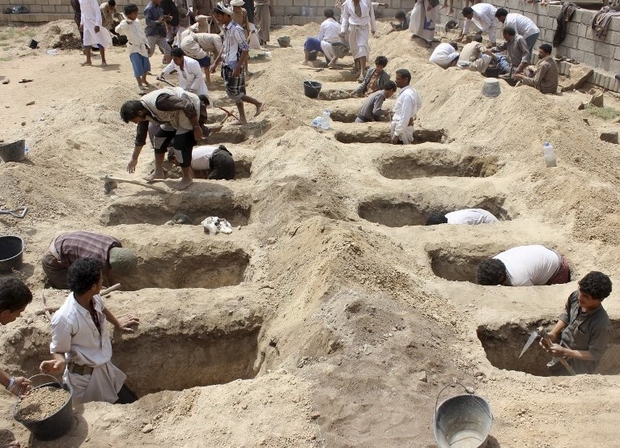
Saudi war crimes covered up by US- backed body in Yemen: HRW
YemenExtra
Y.A
Human Rights Watch says a so-called investigatory body, overseen by Saudi Arabia, has for over two years been covering up war crimes committed by the kingdom in Yemen.
The rights organization released a 90-page analysis on the investigative work of a body, known as the Joint Incidents Assessment Team (JIAT), which is made up of officials from the countries involved in the military “coalition” in Yemen.
The report, titled “Hiding Behind the Coalition: Failure to Credibly Investigate and Provide Redress for Unlawful Attacks in Yemen”, details the Saudi-led coalition investigative body’s “failure” to adequately investigate abuses.
Saudi Arabia has been incessantly pounding Yemen since March 2015 in an attempt to crush the popular Houthi Ansarullah movement and reinstate former president, Abd Rabbuh Mansur Hadi, who is a staunch ally of the Riyadh regime. The Arab kingdom has also imposed a blockade on its impoverished neighbor, causing a dire humanitarian situation.
Middle East director at Human Rights Watch Sarah Leah Whitson said “the coalition has claimed that JIAT was credibly investigating allegedly unlawful airstrikes.”
“But the investigators were doing little more than covering up war crimes,” she added.
A coalition air strike hit a school bus earlier this month in Yemen’s northern Saada province, killing scores of people including at least 40 childern. An investigation by the Washington Post found that US munition was used in the deadly attack.
According to reporters, multiple attacks took place against the camp. The initial strike sent children scrambling for an evacuation bus, then a subsequent strike hit the bus itself. Saudi coalition officials claimed Ansarullah fighters, who are in control of the city, attacked the camp themselves. This is not possible, of course, because Ansarullah and its allies don’t have any warplanes in the first place.
This marks the second major incident of the Saudi-led coalition killing large numbers of children in Yemen in recent weeks, both of the attacks involving attacking a bus. The previous attack, in Sa’ada, killed 51 civilians, 42 of them children. In the Sa’ada attack, the Saudis insisted attacking a school bus full of children was a “legitimate military action.” It is clear, however, that they don’t want to admit to this current attack, as they are trying to pin it, unconvincingly, on Ansarullah.
Whitson warned countries selling arms to Saudi Arabia, including the United States and the UK, that the “sham investigations do not protect them from being complicit in serious violations in Yemen.”
And the US complicity in all this hasn’t been lost on the world state either. Since the dirty war began, the United States has sold over $115 billion worth of weapons to Saudi Arabia. That’s why the world community has on several occasions called for a stop to the US arms and military equipment sales, even a resolution at the United Nations to block such sales. They have also urged the US government to stop re-supplying planes engaged in the reprehensible and illegal bombing runs or providing “intelligence” for the civilian targets that Saudi Arabia is hitting.
According to the report, JIAT has failed to provide information on the various forces involved in specific air strikes, effectively shielding coalition states involved in violations.
Human Rights Watch examined the way in which investigations were carried out by JIAT, asserting that the body “has failed to meet international standards regarding transparency, impartiality, and independence”.
“JIAT appears only to have investigated coalition air strikes, but not other alleged violations of international law by coalition members, such as UAE abuses against people in detention,” the report added.
In six of the attacks discussed in the report, Human Rights Watch identified US-origin munitions used in the attack.
